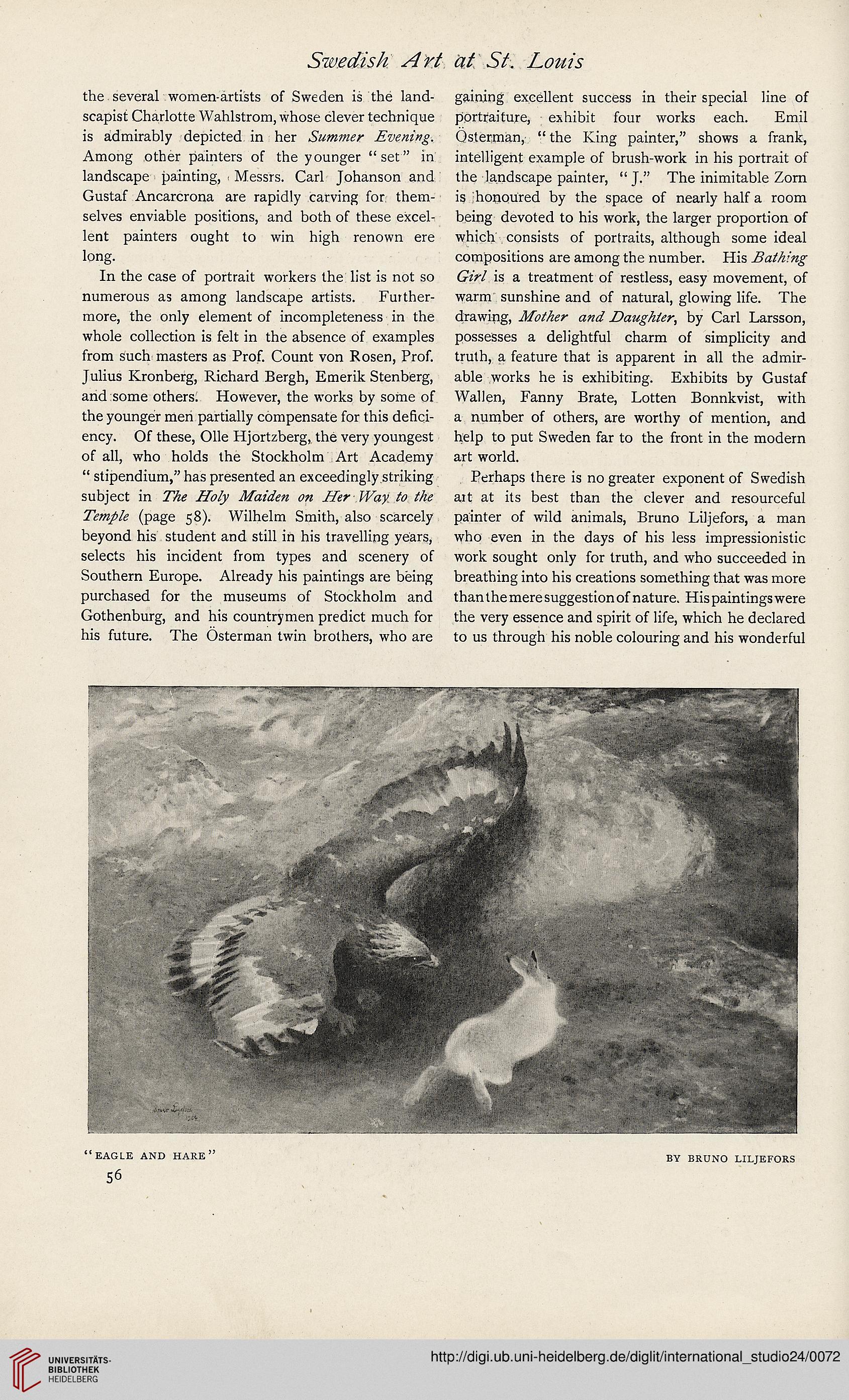Swedish Art at St. Louis
the several women-artists of Sweden is the land-
scapist Charlotte Wahlstrom, whose clever technique
is admirably depicted in her Summer Evening.
Among other painters of the younger “set” in
landscape painting, Messrs. Carl Johanson and
Gustaf Ancarcrona are rapidly carving for them-
selves enviable positions, and both of these excel-
lent painters ought to win high renown ere
long.
In the case of portrait workers the list is not so
numerous as among landscape artists. Further-
more, the only element of incompleteness in the
whole collection is felt in the absence of examples
from such masters as Prof. Count von Rosen, Prof.
Julius Ivronberg, Richard Bergh, Emerik Stenberg,
and some others. However, the works by some of
the younger men partially compensate for this defici-
ency. Of these, Olle Hjortzberg, the very youngest
of all, who holds the Stockholm Art Academy
“ stipendium,” has presented an exceedingly striking
subject in The Holy Maiden on Her Way to the
Temple (page 58). Wilhelm Smith, also scarcely
beyond his student and still in his travelling years,
selects his incident from types and scenery of
Southern Europe. Already his paintings are being
purchased for the museums of Stockholm and
Gothenburg, and his countrymen predict much for
his future. The Osterman twin brothers, who are
gaining excellent success in their special line of
portraiture, exhibit four works each. Emil
Osterman, “the King painter,” shows a frank,
intelligent example of brush-work in his portrait of
the landscape painter, “ J.” The inimitable Zorn
is honoured by the space of nearly half a room
being devoted to his work, the larger proportion of
which consists of portraits, although some ideal
compositions are among the number. His Bathing
Girl is a treatment of restless, easy movement, of
warm sunshine and of natural, glowing life. The
drawing, Mother and Daughter, by Carl Larsson,
possesses a delightful charm of simplicity and
truth, a feature that is apparent in all the admir-
able works he is exhibiting. Exhibits by Gustaf
Wallen, Fanny Brate, Lotten Bonnkvist, with
a number of others, are worthy of mention, and
help to put Sweden far to the front in the modern
art world.
Perhaps there is no greater exponent of Swedish
ait at its best than the clever and resourceful
painter of wild animals, Bruno Liljefors, a man
who even in the days of his less impressionistic
work sought only for truth, and who succeeded in
breathing into his creations something that was more
than the mere suggestion of nature. His paintings were
the very essence and spirit of life, which he declared
to us through his noble colouring and his wonderful
the several women-artists of Sweden is the land-
scapist Charlotte Wahlstrom, whose clever technique
is admirably depicted in her Summer Evening.
Among other painters of the younger “set” in
landscape painting, Messrs. Carl Johanson and
Gustaf Ancarcrona are rapidly carving for them-
selves enviable positions, and both of these excel-
lent painters ought to win high renown ere
long.
In the case of portrait workers the list is not so
numerous as among landscape artists. Further-
more, the only element of incompleteness in the
whole collection is felt in the absence of examples
from such masters as Prof. Count von Rosen, Prof.
Julius Ivronberg, Richard Bergh, Emerik Stenberg,
and some others. However, the works by some of
the younger men partially compensate for this defici-
ency. Of these, Olle Hjortzberg, the very youngest
of all, who holds the Stockholm Art Academy
“ stipendium,” has presented an exceedingly striking
subject in The Holy Maiden on Her Way to the
Temple (page 58). Wilhelm Smith, also scarcely
beyond his student and still in his travelling years,
selects his incident from types and scenery of
Southern Europe. Already his paintings are being
purchased for the museums of Stockholm and
Gothenburg, and his countrymen predict much for
his future. The Osterman twin brothers, who are
gaining excellent success in their special line of
portraiture, exhibit four works each. Emil
Osterman, “the King painter,” shows a frank,
intelligent example of brush-work in his portrait of
the landscape painter, “ J.” The inimitable Zorn
is honoured by the space of nearly half a room
being devoted to his work, the larger proportion of
which consists of portraits, although some ideal
compositions are among the number. His Bathing
Girl is a treatment of restless, easy movement, of
warm sunshine and of natural, glowing life. The
drawing, Mother and Daughter, by Carl Larsson,
possesses a delightful charm of simplicity and
truth, a feature that is apparent in all the admir-
able works he is exhibiting. Exhibits by Gustaf
Wallen, Fanny Brate, Lotten Bonnkvist, with
a number of others, are worthy of mention, and
help to put Sweden far to the front in the modern
art world.
Perhaps there is no greater exponent of Swedish
ait at its best than the clever and resourceful
painter of wild animals, Bruno Liljefors, a man
who even in the days of his less impressionistic
work sought only for truth, and who succeeded in
breathing into his creations something that was more
than the mere suggestion of nature. His paintings were
the very essence and spirit of life, which he declared
to us through his noble colouring and his wonderful




